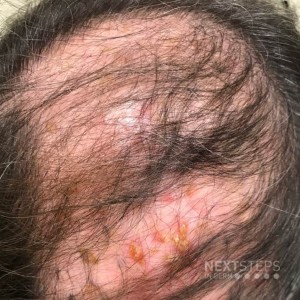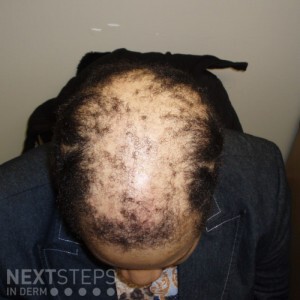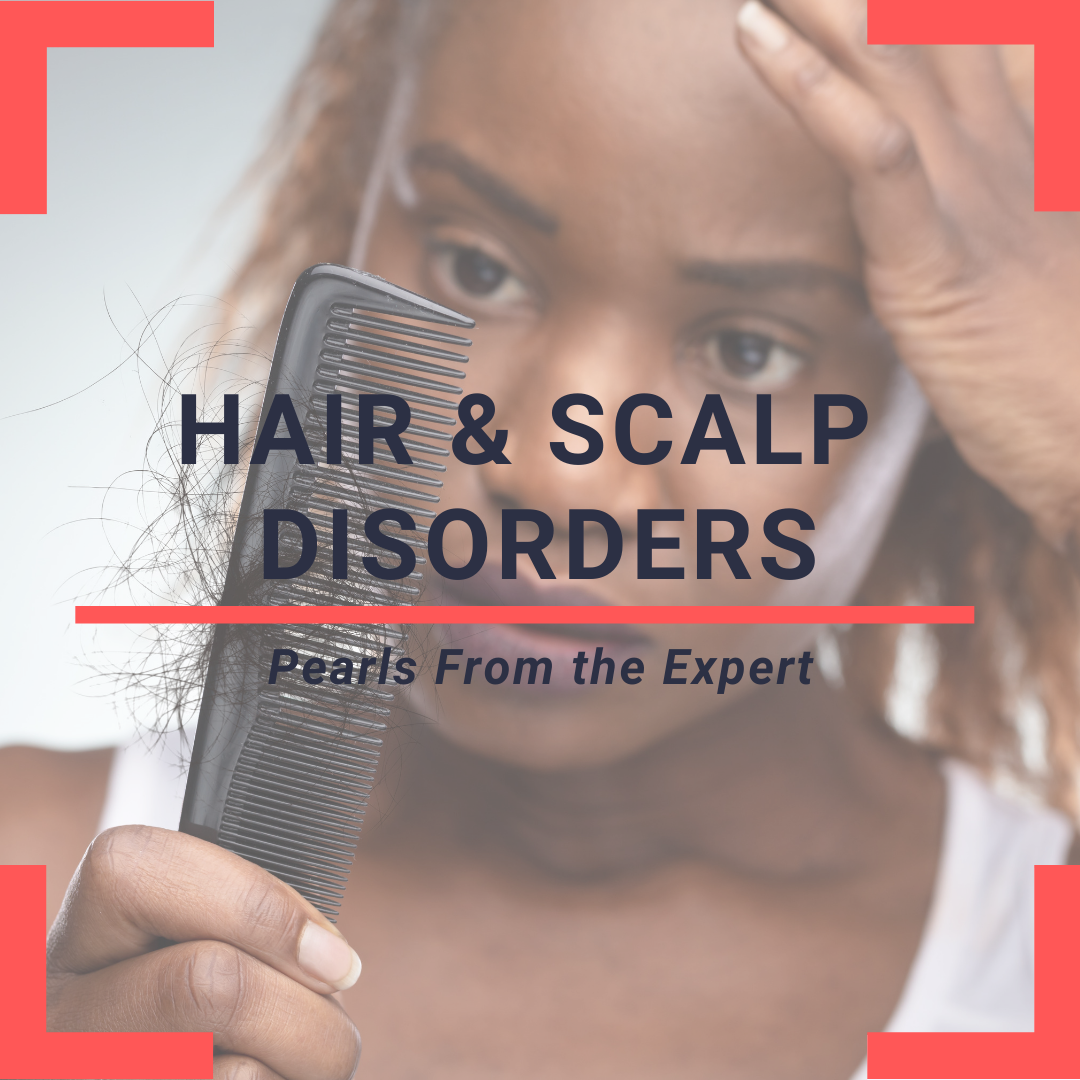Hair Disorders – Friday Pop Quiz 4/10
 Biopsy reveals absence of follicles, a mixed inflammatory infiltrate, and dermal fibrosis. Which of the following is the most likely diagnosis?
A. Dissecting cellulitis
B. Erosive pustular dermatosis
C. Cicatricial pemphigoid
D. Pustular psoriasis
E. Folliculitis decalvans
To find out the correct answer and read the explanation, click here.
Brought to you by our brand partner …
Biopsy reveals absence of follicles, a mixed inflammatory infiltrate, and dermal fibrosis. Which of the following is the most likely diagnosis?
A. Dissecting cellulitis
B. Erosive pustular dermatosis
C. Cicatricial pemphigoid
D. Pustular psoriasis
E. Folliculitis decalvans
To find out the correct answer and read the explanation, click here.
Brought to you by our brand partner …
 Biopsy reveals absence of follicles, a mixed inflammatory infiltrate, and dermal fibrosis. Which of the following is the most likely diagnosis?
A. Dissecting cellulitis
B. Erosive pustular dermatosis
C. Cicatricial pemphigoid
D. Pustular psoriasis
E. Folliculitis decalvans
To find out the correct answer and read the explanation, click here.
Brought to you by our brand partner …
Biopsy reveals absence of follicles, a mixed inflammatory infiltrate, and dermal fibrosis. Which of the following is the most likely diagnosis?
A. Dissecting cellulitis
B. Erosive pustular dermatosis
C. Cicatricial pemphigoid
D. Pustular psoriasis
E. Folliculitis decalvans
To find out the correct answer and read the explanation, click here.
Brought to you by our brand partner … 

 Well+Good recently published an article asking if hair loss supplements actually work.
For an expert opinion, I consulted Crystal Aguh, MD, Director of the Ethnic Skin Program and Assistant Professor in the Department of Dermatology at Johns Hopkins University School of Medicine, Baltimore, MD.
What is the theory behind hair supplements?
Hair supplements are designed to create an ideal nu …
Well+Good recently published an article asking if hair loss supplements actually work.
For an expert opinion, I consulted Crystal Aguh, MD, Director of the Ethnic Skin Program and Assistant Professor in the Department of Dermatology at Johns Hopkins University School of Medicine, Baltimore, MD.
What is the theory behind hair supplements?
Hair supplements are designed to create an ideal nu …  Each month the JDD Dermatology Podcast discusses a current issue in dermatology and this December Dr. Adam Friedman sat down with Dr. Gideon Smith, assistant professor of dermatology at Harvard Medical school, Vice Chair for Clinical Affairs in Dermatology, and Director of the Connective Tissue Diseases Clinic and Fellowship to discuss pruritus in the autoimmune connective tissue world.
Dr. …
Each month the JDD Dermatology Podcast discusses a current issue in dermatology and this December Dr. Adam Friedman sat down with Dr. Gideon Smith, assistant professor of dermatology at Harvard Medical school, Vice Chair for Clinical Affairs in Dermatology, and Director of the Connective Tissue Diseases Clinic and Fellowship to discuss pruritus in the autoimmune connective tissue world.
Dr. …  The best diagnosis of this type of cicatricial alopecia shown in this image is:
A. Chronic cutaneous lupus erythematosus.
B. Lichen planopilaris
C. Central centrifugal cicatricial alopecia
D. Pseudopelade of Brocq
E. Alopecia mucinosa
To find out the correct answer and read the explanation, click here.
Brought to you by our brand partner Derm In-Review
…
The best diagnosis of this type of cicatricial alopecia shown in this image is:
A. Chronic cutaneous lupus erythematosus.
B. Lichen planopilaris
C. Central centrifugal cicatricial alopecia
D. Pseudopelade of Brocq
E. Alopecia mucinosa
To find out the correct answer and read the explanation, click here.
Brought to you by our brand partner Derm In-Review
…  A full head of hair. This is how I came away from Dr. Heather Woolery-Lloyd’s lecture on hair and scalp disorders at the 2019 Skin of Color Update. There were many aspects of her talk that challenged me to rethink how I approach the management of hair loss in my patients. In this post we will cover biotin’s role in treating alopecia, and important considerations in the treatment of central cen …
A full head of hair. This is how I came away from Dr. Heather Woolery-Lloyd’s lecture on hair and scalp disorders at the 2019 Skin of Color Update. There were many aspects of her talk that challenged me to rethink how I approach the management of hair loss in my patients. In this post we will cover biotin’s role in treating alopecia, and important considerations in the treatment of central cen …